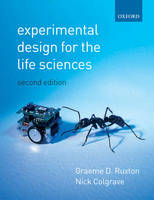
Experimental Design for the Life Sciences
Oxford University Press (Verlag)
978-0-19-928511-2 (ISBN)
- Titel erscheint in neuer Auflage
- Artikel merken
At the core of good research lies the careful design of experiments. Yet all too often a successful design comes only after a painful trial-and-error process, wasting valuable time and valuable resources. Experimental Design for the Life Sciences teaches the reader how to effectively design experiments, to ensure that today's students are equipped with the skills they need to be the researchers of tomorrow. With a refreshingly approachable and articulate style, the book explains the essential elements of experimental design in clear, practical terms, so that the reader can grasp and apply even the most challenging concepts, including power analysis and pseudoreplication. Emphasising throughout the inter-relatedness of experimental design, statistics, and ethical considerations, the book ensures that the reader really understands experimental design in the broader context of biological research, using examples drawn from a range of fields across the biosciences to show to the student how the theory is applied in active research.Above all, Experimental Design for the Life Sciences shows how good experimental design is about clear thinking and biological understanding, not mathematical or statistical complexity - putting it at the heart of any biosciences student's education.
Online Resource Centre: The companion web site features: For lecturers: * Figures from the book available to download, to facilitate lecture preparation For students and lecturers: * Discussion forum, promoting the discussion of experimental design in real research, to stimulate active learning on the part of the student.
Graeme Ruxton obtained a first degree in Physics before getting a PhD in Statistics and Modelling Science. After his PhD he worked for several years with the Scottish Agricultural Statistical Service in Edinburgh. He then got a lectureship in Ecology at the University of Glasgow, where he has been ever since. Nick Colegrave trained as an evolutionary biologist, obtaining his first degree at the University of Sussex, and his PhD on the evolution of competition strategies at the University of Sheffield. Since then he has held a number of postdoctoral research positions at a range of universities including, McGill, St Andrews, Glasgow and Edinburgh, working on various aspects of evolutionary biology, with a range of organisms. At various points he has also held the post of zoology demonstrator at the University of Edinburgh, teaching experimental design to zoology students and advising on statistics. He is now lecturer in Invertebrate Zoology at Edinburgh.
PREFACE - HOW TO USE THIS BOOK; 1. Why care about design?; 2. Starting with a well defined question; 3. Between-individual variation, replication and sampling; 4. Different experimental designs; 5. Taking measurements; 6. Final thoughts; BIBLIOGRAPHY
| Erscheint lt. Verlag | 31.3.2006 |
|---|---|
| Co-Autor | Nick Colegrave |
| Zusatzinfo | 40 line drawings |
| Verlagsort | Oxford |
| Sprache | englisch |
| Themenwelt | Naturwissenschaften ► Biologie ► Allgemeines / Lexika |
| ISBN-10 | 0-19-928511-X / 019928511X |
| ISBN-13 | 978-0-19-928511-2 / 9780199285112 |
| Zustand | Neuware |
| Haben Sie eine Frage zum Produkt? |
aus dem Bereich



